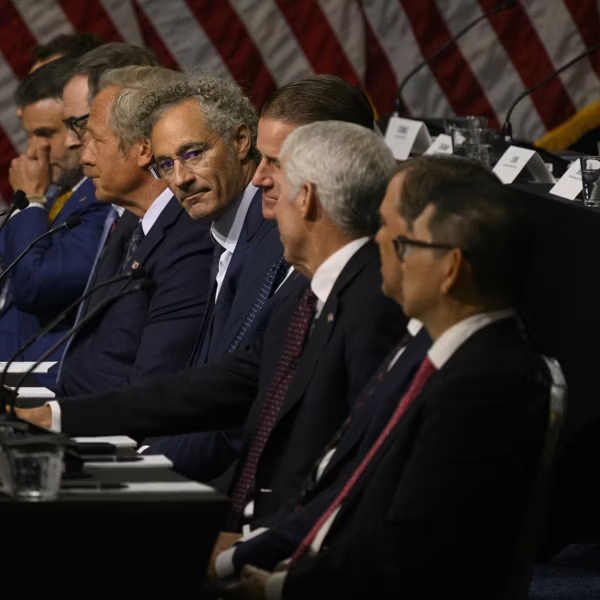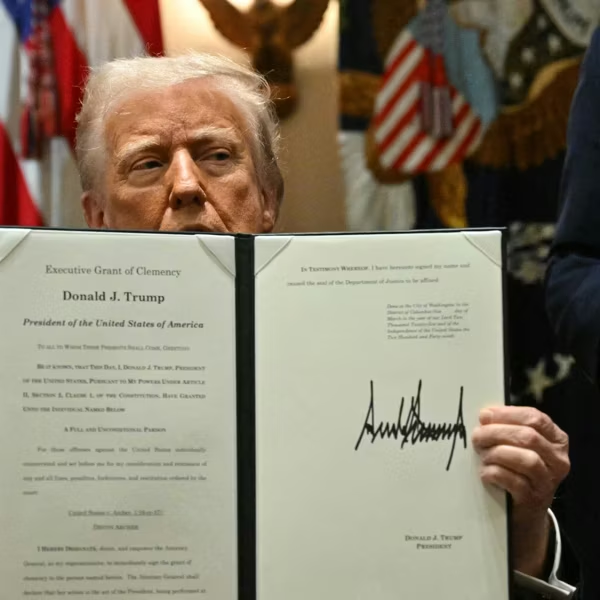Trump, Who "Can't Be Bought," Rewards Big Donors With Cabinet Roles
Politico reports that nearly a third of people who have met with president-elect since November gave millions to Republicans in 2016 cycle
Dozens of President-elect Donald Trump's biggest donors are now being considered for administration positions, and the amount of financial supporters who ended up in his cabinet is "unparalleled in modern presidential history," Politico reported on Tuesday.
Of the 200 people that Trump has met with since the election, almost a third--73 people--are donors, Politico's Isaac Arnsdorf wrote. They contributed a collective $1.7 million to Trump and groups supporting him, and an additional $57.3 million to the rest of the Republican party, according to an analysis of Federal Elections Commission (FEC) records. The average donor gave about $800,000.
Donors made up about 39 percent of the 119 people Trump considered for cabinet appointments so far, and of that number, 38 percent were eventually picked, Arnsdorf writes.
Those include Todd Ricketts, the nominee for deputy secretary of commerce, whose wealthy family gave about $15.7 million to Republicans in the 2016 election; Amway heiress Betsy DeVos, nominee for education secretary, whose family spent $10.4 million this cycle and has donated to some of the senators who will vote on her confirmation; Linda McMahon, nominee to head the Small Business Administration, who gave $6 million to a pro-Trump super PAC; and Andy Puzder, nominee for labor secretary who gave $160,000 to Trump Victory joint fundraising committee.
In addition to those who were nominated to cabinet positions, many big donors are poised to help shape policy from outside of Capitol Hill, Arnsdorf writes:
Rebekah Mercer--who with her father, the hedge fund billionaire Robert Mercer, spent more than $22 million backing Republicans this cycle--is closely aligned with chief strategist Steve Bannon and special counselor Kellyanne Conway, and she has taken a crucial role picking cabinet jobs. Robert Mercer gave $2 million to a pro-Trump super PAC.
Peter Thiel, the Silicon Valley venture capitalist playing an influential role on Trump's transition team, spent almost $3.3 million this cycle, including $250,000 to Trump Victory and $1 million to a super PAC.
That unprecedented level of access is the latest in a long line of revelations that contradict Trump's promise to staff his cabinet with anti-establishment picks. In addition to nominating donors, Trump is also amassing the wealthiest administration in modern history.
The president-elect also spent much of his time on the campaign trail criticizing his Republican opponents and Democratic rival Hillary Clinton for taking contributions from mega-donors, stating in July 2015, "They will be bombarded by their lobbyists that donated a lot of money to them....they'll say: 'You have to do it. They gave you a million dollars to your campaign.'"
In September of that year, he wrote on his Facebook page, "By self-funding my campaign, I am not controlled by my donors, special interests or lobbyists. I am only working for the people of the U.S.!"
Trevor Potter, executive director of the Campaign Legal Center, told Politico on Tuesday, "If the people who are counseling the president-elect are the donor class--who, as Trump told us, give because they want something in return, those are his words--you will not get the policies his voters were hoping for."
"The risk here is disillusionment by the voters who voted for change and are going to end up with a plutocracy," Potter said.
An Urgent Message From Our Co-Founder
Dear Common Dreams reader, The U.S. is on a fast track to authoritarianism like nothing I've ever seen. Meanwhile, corporate news outlets are utterly capitulating to Trump, twisting their coverage to avoid drawing his ire while lining up to stuff cash in his pockets. That's why I believe that Common Dreams is doing the best and most consequential reporting that we've ever done. Our small but mighty team is a progressive reporting powerhouse, covering the news every day that the corporate media never will. Our mission has always been simple: To inform. To inspire. And to ignite change for the common good. Now here's the key piece that I want all our readers to understand: None of this would be possible without your financial support. That's not just some fundraising cliche. It's the absolute and literal truth. We don't accept corporate advertising and never will. We don't have a paywall because we don't think people should be blocked from critical news based on their ability to pay. Everything we do is funded by the donations of readers like you. Will you donate now to help power the nonprofit, independent reporting of Common Dreams? Thank you for being a vital member of our community. Together, we can keep independent journalism alive when it’s needed most. - Craig Brown, Co-founder |
Dozens of President-elect Donald Trump's biggest donors are now being considered for administration positions, and the amount of financial supporters who ended up in his cabinet is "unparalleled in modern presidential history," Politico reported on Tuesday.
Of the 200 people that Trump has met with since the election, almost a third--73 people--are donors, Politico's Isaac Arnsdorf wrote. They contributed a collective $1.7 million to Trump and groups supporting him, and an additional $57.3 million to the rest of the Republican party, according to an analysis of Federal Elections Commission (FEC) records. The average donor gave about $800,000.
Donors made up about 39 percent of the 119 people Trump considered for cabinet appointments so far, and of that number, 38 percent were eventually picked, Arnsdorf writes.
Those include Todd Ricketts, the nominee for deputy secretary of commerce, whose wealthy family gave about $15.7 million to Republicans in the 2016 election; Amway heiress Betsy DeVos, nominee for education secretary, whose family spent $10.4 million this cycle and has donated to some of the senators who will vote on her confirmation; Linda McMahon, nominee to head the Small Business Administration, who gave $6 million to a pro-Trump super PAC; and Andy Puzder, nominee for labor secretary who gave $160,000 to Trump Victory joint fundraising committee.
In addition to those who were nominated to cabinet positions, many big donors are poised to help shape policy from outside of Capitol Hill, Arnsdorf writes:
Rebekah Mercer--who with her father, the hedge fund billionaire Robert Mercer, spent more than $22 million backing Republicans this cycle--is closely aligned with chief strategist Steve Bannon and special counselor Kellyanne Conway, and she has taken a crucial role picking cabinet jobs. Robert Mercer gave $2 million to a pro-Trump super PAC.
Peter Thiel, the Silicon Valley venture capitalist playing an influential role on Trump's transition team, spent almost $3.3 million this cycle, including $250,000 to Trump Victory and $1 million to a super PAC.
That unprecedented level of access is the latest in a long line of revelations that contradict Trump's promise to staff his cabinet with anti-establishment picks. In addition to nominating donors, Trump is also amassing the wealthiest administration in modern history.
The president-elect also spent much of his time on the campaign trail criticizing his Republican opponents and Democratic rival Hillary Clinton for taking contributions from mega-donors, stating in July 2015, "They will be bombarded by their lobbyists that donated a lot of money to them....they'll say: 'You have to do it. They gave you a million dollars to your campaign.'"
In September of that year, he wrote on his Facebook page, "By self-funding my campaign, I am not controlled by my donors, special interests or lobbyists. I am only working for the people of the U.S.!"
Trevor Potter, executive director of the Campaign Legal Center, told Politico on Tuesday, "If the people who are counseling the president-elect are the donor class--who, as Trump told us, give because they want something in return, those are his words--you will not get the policies his voters were hoping for."
"The risk here is disillusionment by the voters who voted for change and are going to end up with a plutocracy," Potter said.
Dozens of President-elect Donald Trump's biggest donors are now being considered for administration positions, and the amount of financial supporters who ended up in his cabinet is "unparalleled in modern presidential history," Politico reported on Tuesday.
Of the 200 people that Trump has met with since the election, almost a third--73 people--are donors, Politico's Isaac Arnsdorf wrote. They contributed a collective $1.7 million to Trump and groups supporting him, and an additional $57.3 million to the rest of the Republican party, according to an analysis of Federal Elections Commission (FEC) records. The average donor gave about $800,000.
Donors made up about 39 percent of the 119 people Trump considered for cabinet appointments so far, and of that number, 38 percent were eventually picked, Arnsdorf writes.
Those include Todd Ricketts, the nominee for deputy secretary of commerce, whose wealthy family gave about $15.7 million to Republicans in the 2016 election; Amway heiress Betsy DeVos, nominee for education secretary, whose family spent $10.4 million this cycle and has donated to some of the senators who will vote on her confirmation; Linda McMahon, nominee to head the Small Business Administration, who gave $6 million to a pro-Trump super PAC; and Andy Puzder, nominee for labor secretary who gave $160,000 to Trump Victory joint fundraising committee.
In addition to those who were nominated to cabinet positions, many big donors are poised to help shape policy from outside of Capitol Hill, Arnsdorf writes:
Rebekah Mercer--who with her father, the hedge fund billionaire Robert Mercer, spent more than $22 million backing Republicans this cycle--is closely aligned with chief strategist Steve Bannon and special counselor Kellyanne Conway, and she has taken a crucial role picking cabinet jobs. Robert Mercer gave $2 million to a pro-Trump super PAC.
Peter Thiel, the Silicon Valley venture capitalist playing an influential role on Trump's transition team, spent almost $3.3 million this cycle, including $250,000 to Trump Victory and $1 million to a super PAC.
That unprecedented level of access is the latest in a long line of revelations that contradict Trump's promise to staff his cabinet with anti-establishment picks. In addition to nominating donors, Trump is also amassing the wealthiest administration in modern history.
The president-elect also spent much of his time on the campaign trail criticizing his Republican opponents and Democratic rival Hillary Clinton for taking contributions from mega-donors, stating in July 2015, "They will be bombarded by their lobbyists that donated a lot of money to them....they'll say: 'You have to do it. They gave you a million dollars to your campaign.'"
In September of that year, he wrote on his Facebook page, "By self-funding my campaign, I am not controlled by my donors, special interests or lobbyists. I am only working for the people of the U.S.!"
Trevor Potter, executive director of the Campaign Legal Center, told Politico on Tuesday, "If the people who are counseling the president-elect are the donor class--who, as Trump told us, give because they want something in return, those are his words--you will not get the policies his voters were hoping for."
"The risk here is disillusionment by the voters who voted for change and are going to end up with a plutocracy," Potter said.


